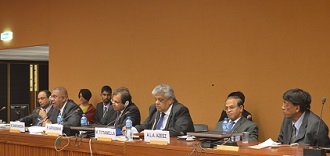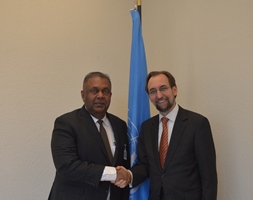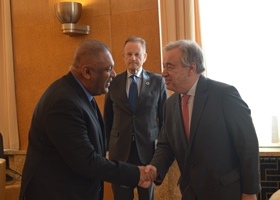
Ambassador Ravinatha Aryasinha, Sri Lanka's Permanent Representative to the UN in Geneva delivered the Statement on behalf of the Government of Sri Lanka as the country concerned during the Interactive Dialogue with the Special Rapporteur (SR) on Minority Issues, at the 34th Session of the Human Rights Council today (15 March 2017). The statement followed the presentation of the Report (A/HRC/34/53/Add.3) by the Special Rapporteur Ms. Rita Izsák-Ndiaye on her visit to Sri Lanka from 10 to 20 October 2016.
Full Statement
Permanent Mission of Sri Lanka
Geneva
15 March 2017

Hon. Mangala Samaraweera, Minister of Foreign Affairs, Hon. Jayampathy Wickramaratne, MP, President's Counsel (PC), Mr. Mano Tittawella, Secretary General Secretariat for Coordinating Reconciliation Mechanisms (SCRM) and other government officials and Mr. Jehan Perera, Executive Director, National Peace Council of Sri Lanka representing the NGOs and civil society briefed members of civil society and Permanent Missions at a Side Event on ‘Developments in Sri Lanka’ on the sidelines of the 34th Session of the Human Rights Council held at the Palais des Nations on 01 March 2017.

Minister of Foreign Affairs, Mangala Samaraweera met UN High Commissioner for Human Rights Zeid Ra’ad Al Hussein at the Palais des Nations in Geneva on 01 March 2017.

Ambassador Ravinatha Aryasinha, Sri Lanka's Permanent Representative to the UN in Geneva delivered the Statement on behalf of the Government of Sri Lanka as the country concerned during the Clustered Interactive Dialogue with the Special Rapporteur on Torture and other Cruel, Inhuman or Degrading Treatment or Punishment, Dr. Nils Melzer, at the 34th Session of the Human Rights Council today (02 March 2017). The statement followed the presentation of the Report (A/HRC/34/54/Add.2) on the visit of previous Special Rapporteur on Torture, Mr. Juan E. Mendez to Sri Lanka from 29 April to 7 May 2016.
Full Statement
Permanent Mission of Sri Lanka
Geneva
02 March 2017

Foreign Minister Mangala Samaraweera who is presently in Geneva to participate in the High-Level segment of the 34th Session of the UN Human Rights Council met UN Secretary-General Antonio Gueterres Monday (27). This was the first meeting of the Minister with the new UN Secretary-General who took office in January this year. Recalling his several visits to Sri Lanka from 1978 onwards, including as High Commissioner for Refugees, the Secretary-General said that Sri Lanka is a country that is very dear to his heart.
Statement by Foreign Minister Mangala Samaraweera to the 34th Session of the UN Human Rights Council

Minister of Foreign Affairs, Mangala Samaraweera, leader of the Sri Lanka delegation, addressed the 34th Session of the Human Rights Council at the Palais des Nations in Geneva, today (28th February 2017).
Hon. Jayampathy Wickramaratne, MP, President's Counsel (PC), Ambassador Ravinatha Aryasinha, Permanent Representative of Sri Lanka to the UN in Geneva, Mr. Mano Tittawella, Secretary General, Secretariat for Coordinating Reconciliation Mechanisms (SCRM), Mr. A.L.A. Azeez, Senior DG/EU, Multilateral Treaties and Commonwealth, Ministry of Foreign Affairs of Sri Lanka and other senior officials of the Government of Sri Lanka comprised the Sri Lanka delegation to the 34th HRC.
Permanent Mission of Sri LankaGeneva28th February 2017

Consideration of the 8th Periodic Review of Sri Lanka to the Committee on the Elimination of All Forms of Discrimination against Women (CEDAW) took place at the 66th Session of the Committee against Women, held at the Palais Wilson in Geneva, on 22 February 2017. Mrs. Chandrani Senaratna , Secretary Ministry of Women and Child Affairs of Sri Lanka led the delegation.
